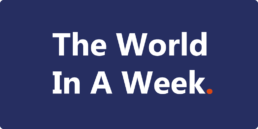The World In A Week - PRITI Scores
Last week the Home Secretary, Priti Patel announced a new points-based immigration system as part of the post-Brexit reform. This will bring an end to the free movement of labour and will come into play from the 1st January 2021. The new system builds on the Australian immigration model where the objective is to create a high wage, high skill and more productive economy. The new system would require visa applicants to have a job offer from an approved employer at an appropriate skill level and the ability to speak English. Further points are then awarded based on salary and qualifications, ensuring that the UK continues to attract the brightest and the best. The policy is moving away from the reliance upon lower-skilled workers, but this could lead to a shortage of staff in the social care sector where currently foreign workers make up a sixth. The average salary in this sector is £20,536 meaning these workers would not qualify for points under the new system. The policy is the biggest immigration reform in decades as the UK continues to regain control of its borders.
The UK inflation rate rose to a six-month high of 1.8% but is not expected to change the outlook for interest rates when the Monetary Policy Committee next meet on the 26th March. This week also saw the circulation of the new polymer £20 note with almost 2 billion having now been printed. The introduction of the new note will hopefully reduce the number of fraud instances reported with 88% of the forgeries discovered belonging to the £20 note. The new £50 polymer note is expected to be released next year and will feature the face of Alan Turing. The rise of digital finance and the convenience of online payments has reduced the need for cash. In 2018, cash payments formed 28% of total payments in the UK and is set to decrease to 9% by 2028 with the increasing reliance upon debit/credit cards and the rapid uptake of contactless technology. Sweden is the market leader in this space and is expected to become entirely cashless by 2023, the first country to ever do so. The emergence of Swish, an electronic payments service has enabled this fast transition, with only 1% of transactions now being completed by cash.
Elsewhere, the Coronavirus is continuing to cause a slump in global economic activity. The US Purchasing Managers’ Index (PMI) data showed that business activity fell from 53.4 to 49.4 in January, the first time PMI has fallen since 2016. Furthermore, the S&P dropped -0.81% and investors have switched to government bonds. There are now fears that the Coronavirus could become a pandemic and is expected to continue to disrupt the markets in the short term.
The World In A Week - Will Markets Catch A Cold?
Cases of the Covid-19, otherwise known as the Coronavirus, spiked last week, although we note that this is due to the inclusion of reclassified cases. On a positive note, laboratory confirmed cases were lower, which suggests that the disease is spreading at a slower rate, although the death toll has now exceeded that of SARS. The economic impact of the virus has been mixed thus far, but we believe it will have long-reaching, knock-on effects to the greater Asian region. It is thought that the People’s Bank of China (PBoC) is likely to provide liquidity, to ease funding conditions in Chinese money markets in an effort to tackle downside risk posed by the virus and that further measures to support the economy could follow.
Leading into a long weekend for US citizens, who will be celebrating President’s Day, US economic data remained robust. Labour market indicators, especially workers who are quitting for new jobs and small business optimism, were particularly positive. January retail sales rose in line with expectations of 0.3%, this was mostly driven by online and other non-store sales. Earnings also continue to be strong; of 80% of S&P 500 companies that reported in December 2019, 76% beat earnings expectations, which is in line with the long-term trend, suggesting the economy is in rude health.
In the UK, the ‘Boris Effect’ continues to be felt; Chancellor Sajid Javid resigned from the Cabinet following Boris’ request to sack all of his advisors, a request that Javid felt was a move too far. It has been widely publicised that there have been tensions between Javid, and Boris’s top adviser, Cummings, who wanted more control over economic policy and spending in the last few months. Javid’s departure made way for the appointment of Rishi Sunak who has a tall task ahead; with the Budget due to take place on 11th March, it is questionable if this will go ahead.
The World In A Week - Policy Preferences
Last week saw a reversal of fortune regarding market performance as global equities shrugged off concerns with MSCI AWCI rising +4.6% in GBP terms. This was primarily driven by the Chinese and US stock markets (up +6.5% and +5.1% respectively) and rests on the assumption that the Coronavirus outbreak can be contained. A secondary-order assumption stemming from the Coronavirus outbreak is that any economic slowdown will be countered with easier monetary policy from the world’s central banks, namely the People’s Bank of China and the Federal Reserve in the US.
This reversal in sentiment was also observed in the fixed income markets; high yield bonds rallied +0.60% while high quality bonds lost -0.12% - both in GBP hedged terms.
While the assumption that central banks will provide ever-increasing degrees of monetary stimulus to calm nervous markets has worked well as an investment strategy since the financial crisis, signs are appearing that this relationship could come to an end. Negative interest rates are being used in an attempt to stimulate growth in the Eurozone, Japan, Denmark, Switzerland and Hungary. Thus far the success of this experiment has left much to be desired, and the efficacy of negative rates is now being called into question by many. In December 2019, the Swedish central bank, the Riksbank, decided to abandon the negative interest rate experiment and raised rates to 0%.
The ineffectiveness of monetary policy to bolster further economic growth has led many market participants advocating a pivot to fiscal policy to pick up the slack. Governments in the UK and Europe seem to be gradually moving to take advantage of low interest rates for infrastructure spending. In addition, left wing economic policy is coming more into fashion around the globe, Bernie Sanders is leading the polls in the democratic primaries and over the weekend the Irish electorate returned Sinn Fein as the largest party in a general election. We continue closely to monitor policy makers preferences for economic stimulus and how markets will react.
The World In A Week - Love Changes Everything?
Today we could have written about the United Kingdom no longer being part of the European Union, as Friday saw us exit, but without any clarity around the trade relationship for the future. This is the start of the long journey towards clarity around how we will interact with Europe going forward.
We could have written about Mark Carney’s last Monetary Policy Committee as governor of the Bank of England. The expectation for an interest rate cut had surged during January, however the committee voted 7:2 to keep UK interest rates at 0.75%. Mr. Carney officially stands down on 15th March after extending his governorship twice in order to see the UK leave the EU in an orderly manner.
What we are writing about is the Coronavirus and the concerns that this raises with short-term sentiment in the financial markets. Fear is the biggest economic threat and fear spreads more quickly when carried on the wings of social media; Google searches for ‘Coronavirus’ have risen sharply over the past week. It seems fear changes everything.
Fear changes consumers’ economic behaviour and in turn changes policy makers’ responses. In response to help contain the spread of the virus, China extended the Lunar New Year holiday to three days, with financial markets opening today. This has knock on effects for global supply chains and even a short disruption to global manufacturing should not be ignored. Companies should have enough inventory, but if Chinese companies are closed long enough, European and US production may suffer a lack of parts. We would expect sentiment surveys to worsen on the back of this.
The World Health Organisation has now declared the Coronavirus outbreak a Public Health Emergency of International Concern. We believe that international measures to stop the spread of the virus will ultimately prove effective and there are early signs that the rate of increase in the number of new cases is slowing. It would appear the world was much more prepared for this type of outbreak than it was in 2003, with the Chinese government being pre-emptive and transparent, especially in quarantining major cities.
As we wrote last week, action will be compared to the SARS outbreak in 2003 and the blueprint is this current crisis could last between three and six months. We must keep in mind that this period of apprehension will eventually end, but in the meantime, we will probably face more bad news as media sources continue to use more emotive headlines, which will likely impact markets in the short-term.
The World In A Week - The Year Of The Rat
An eventful week that saw the continued spread of the Coronavirus in China, the opening arguments of Trump’s impeachment trial and the 51st World Economic Forum in Davos.
The World Health Organisation have called for emergency action in China following 830 confirmed cases with 41 deaths reported so far. The Chinese city of Wuhan, home to some 11 million people has been inundated with new patients seeking treatment. A completely new hospital is set to be completed in the next 6 days and will house 1000 beds. This follows similar action taken in 2003 following the SARS virus outbreak. The timing is far from ideal as China celebrated its New Year on the 25th January and is in a period of stagnated growth. Economic activity is expected to drop significantly with reduced worker mobility and spending power, following the travel ban that encompasses 12 cities, affecting 35 million people. There has been a large-scale demand for surgical masks and gloves with more than 80 million masks sold. China’s Tencent has also cancelled the firm’s annual bonus release which gives employees the chance to meet chief executive Ma Huateng amid enhanced virus concerns.
The most recent chapter in the impeachment trial sees President Trump’s legal team present their case against his removal from power. The session was very brief with the main statements set for this upcoming week. However, it was clear that further evidence is needed to support any case for the removal of Trump, and this would certainly undermine the US political vote as the presidential election race gathers speed. Two-thirds vote of the Senate are required to remove the President from office, an event that has never happened in US Politics.
Climate crisis was once again the topic of discussion at the World Economic Forum in the ski resort of Davos, Switzerland. President Trump’s comments again sparked debate as he compared Tesla CEO, Elon Musk, to the great Thomas Edison. This follows the significant up-surge of Tesla shares which have increased by just over $300 in the last 3 months. Trump was also quick to boast his role in accelerating economic growth, with unemployment at its lowest rate for 50 years. Most notably, Greta Thunberg echoed her climate crisis call by encouraging global leaders to act immediately, further emphasised by US Vice President Al Gore, who compared the global crisis to the 9/11 event.
The World In A Week - Waiting For The Turn
Although the year is still young, thus far into January markets have seen a broad continuation of the trends we observed in Q4 of 2019, and indeed for many of the last few years. US Equity outpaced other global markets by quite some margin, with the S&P 500 returning +2.21% in Sterling terms; although this was aided by a mild weakening in the British Pound against the US Dollar. The Price/Earnings ratio for the S&P 500 now stands at 26x on a trailing 12-month basis, as calculated by the Wall Street Journal, that is very expensive indeed on this measure.
Global growth equities have continued to outperform value equities (+5.8% vs +2.6% for the month to date), as they have done in the aggregate since the financial crisis. Again, valuations are stretched to extremes – although we generally view stretched valuations as opportunities to add value rather than risks to be avoided. As a result, we maintain our overweight to Global Emerging Market Equity into the New Year as it offers considerably better value than other equity markets.
On the Fixed Income side, we saw the rally in junk (or high yield) bonds extend from December into January as Global High Yield Debt rallied +0.9% in GBP Hedged terms last week. We are deeply sceptical that there is any opportunity to be had in high yield at current prices and maintain our underweight in favour of Investment Grade Credit. Emerging Market Local Currency Debt, which was one of our most successful positions last year, has pulled back marginally this month (-0.30%) but we remain bullish on the asset class in general and our Fund manager in particular.
On the macro side, we track the Composite Leading Indicators produced for each major economy by the OECD on a monthly basis. The latest data was released this morning and showed a moderate stabilisation in economic data across a range of developed and emerging economies. One among these was the UK, which is interesting in the context of a potential rate cut by the Bank of England. This would be highly premature in our opinion. Employment data is still robust, and while retail sales have been poor in aggregate, most of this is due to business models on the high street being disrupted rather than an underlying economic malaise.
We continue to remain focused on only taking risks for which we are adequately compensated, monitoring market developments for when trends might begin to turn and looking for tactical opportunities to add value to the portfolios.
The World In A Week - Big Headlines, Small Details
Geopolitics continued to grab headlines last week. The US-Iran conflict is currently the biggest source of instability for investors, although tensions showed signs of abating as the week progressed, with both sides relaying that retaliation was over. Despite the White House making noises regarding further economic sanctions, we do not expect further escalation around this specific situation. The cynic in us however believes that should Trump’s ratings deteriorate; we could see these tensions rekindled.
There was good news in the UK; following several days of debate, the Commons approved Boris Johnson’s agreement on how the UK would leave the European Union on 31st January 2020. This decision is now waiting for approval from the House of Lords. In what has been a long-awaited step forward, we are now set for intense discussion between the UK and Brussels, who cannot agree on how long discussions over the future relationship should last, with the chair of the European Commission voicing her concerns that it will be impossible to reach an agreement by the end of 2020. We think that it is highly likely that Boris Johnson will ask for an extension to the transition period by the end of the deadline, 30th June 2020, and that UK equity markets will subsequently rise.
Markets were buoyant last week, despite the tensions between Iran and the US. The most likely explanation for this is that Trump is due to sign the Phase I agreement with China in Washington on Wednesday, which will cement the foundations for the next phase of negotiations. While the downward pressure on global growth for the year ahead has relented, we must remind ourselves that the agreement has limitations, as most of the tariffs will remain in place.




The World In A Week - Planes, Trains And Automobiles
It was media heaven last week as the headlines screamed about the worst week for investors since the global financial crisis in 2008. The Coronavirus has encapsulated the fears of investors; like the disease, they fear the spread and fallout in markets will ultimately lead to the next recession.
Policymakers around the world look to grapple with the consequences of transport and supply chain disruptions resulting from efforts to contain the outbreak. A degree of forbearance is needed for companies who have been affected the most from the global supply chain disruption. It is important that any policy response needs to be granular and specific, as the previous blunt tool of interest rates cuts will arguably not be sufficient in this instance.
The Federal Reserve is still the world’s most influential central bank and last Friday Jerome Powell issued a statement that has set expectations for resumption of interest rate cuts in the US. At the beginning of the year, the markets were pricing in just one interest rate cut in the US; this has now increased to three and will probably mean a rare cut during a presidential election.
In situations like this, the best cognitive course of action is to think of the extreme outcomes that may arise. There are two possible consequences from the Coronavirus outbreak: either it ends up being the pin to burst the economic expansion or it acts as a pump to prime the next wave of stimulus.
We would expect markets to continue to be volatile until the spread of the virus is brought under control and there are tentative signs that this is already happening. For investors, now is the time to hold your nerve and not be tempted into a knee-jerk reaction of selling your long-term investments in reaction to short-term market mayhem.